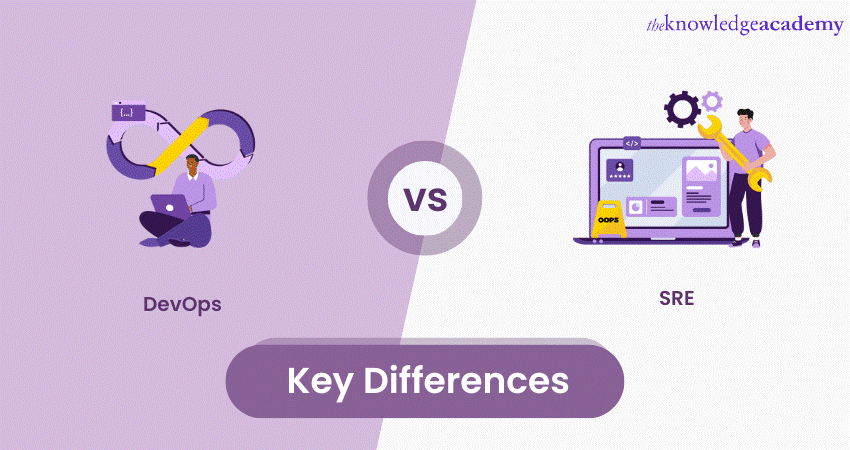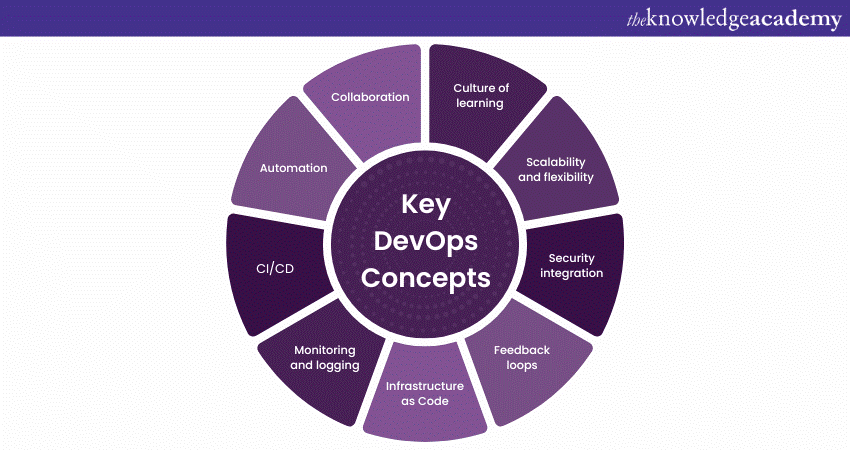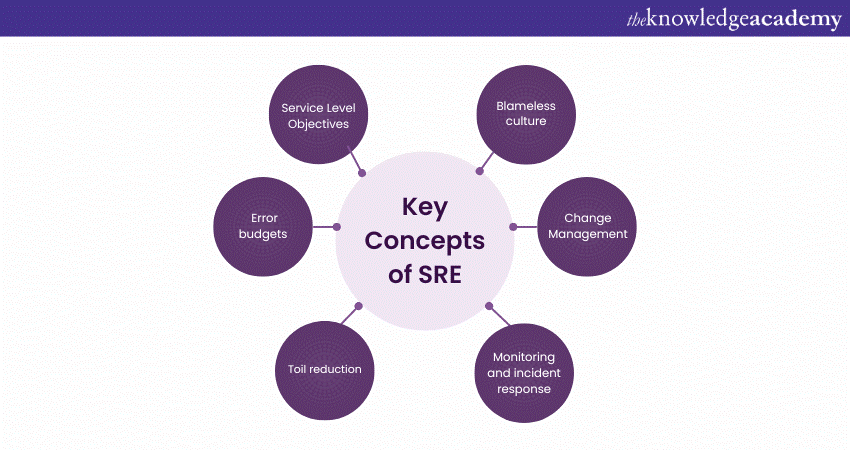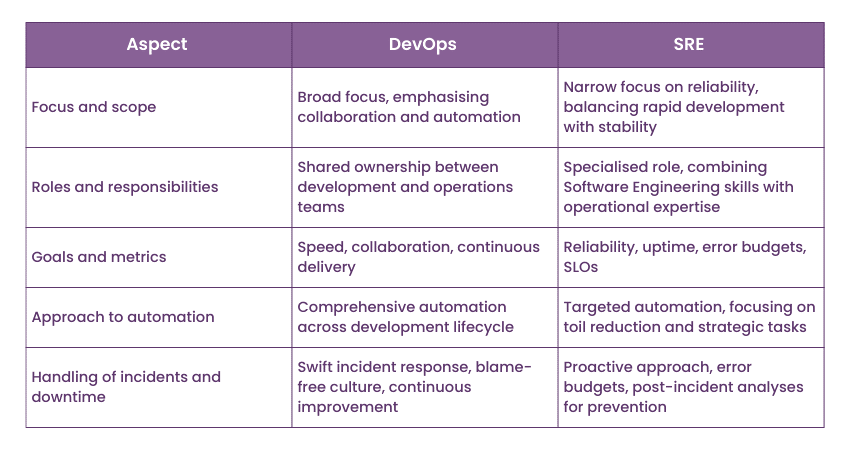We may not have the course you’re looking for. If you enquire or give us a call on +971 8000311193 and speak to our training experts, we may still be able to help with your training requirements.
We ensure quality, budget-alignment, and timely delivery by our expert instructors.

DevOps and Engineering (SRE) have emerged as indispensable methodologies in the modern domain of Software Development. DevOps focuses on collaboration and communication among Software Development and IT operations teams. At the same time, SRE blends aspects of Software Engineering with IT operations to create a balance between reliability, availability, and development speed. Due to them being closely associated, it is no wonder that people often search about DevOps vs SRE.
Though the methodologies are closely related, they have a distinct set of differences. Understanding these differences between DevOps and SRE is crucial for organisations aiming to enhance their software delivery processes. In this blog, we will provide you with a detailed comparison of DevOps vs SRE to help you make an informed choice. Keep reading!
Table of Contents
1)What is DevOps?
2)What is SRE?
3)DevOps vs SRE: What’s the difference?
4)DevOps vs SRE: Factors to consider when choosing
5)Conclusion
What is DevOps?
DevOps, short for Development and Operations, is a collaborative approach in Software Development aimed at unifying development, IT operations, and quality assurance teams. It nurtures a culture of collaboration and communication, breaking down silos that traditionally separated these functions.
DevOps emphasises shared responsibilities, enabling faster deployments, quicker issue resolution, and a more efficient feedback loop. By bridging the gap between development and operations, DevOps enhances agility, encourages innovation, and improves overall software quality and reliability. Some of the key DevOps concepts are:

Collaboration
DevOps nurtures a culture of collaboration and communication between development, operations, and other stakeholders. Teams work together seamlessly, breaking down traditional silos and fostering shared responsibility.
Automation
Automation is at the core of DevOps practices. It involves automating repetitive tasks, such as code integration, testing, deployment, and infrastructure provisioning. Automation ensures consistency, reduces manual errors, and accelerates the software delivery process.
Continuous Integration and Continuous Deployment (CI/CD)
DevOps encourages the continuous integration of code changes into a shared repository. Automated tests are run to ensure code quality, and changes are deployed automatically to production environments through CI/CD pipelines. This enables rapid and reliable releases.
Monitoring and logging
DevOps emphasises real-time monitoring of applications and infrastructure. Monitoring tools track system performance, detect issues, and provide valuable insights. Logging mechanisms record events, errors, and activities, aiding in troubleshooting and analysis.
Infrastructure as Code (IaC)
DevOps utilises IaC, where infrastructure is managed and provisioned through code rather than manual processes. This allows for version control, reproducibility, and efficient management of infrastructure resources.
Feedback loops
DevOps thrives on feedback loops, enabling continuous improvement. Feedback is gathered from various stages of the development lifecycle and used to enhance processes, identify bottlenecks, and implement iterative enhancements.
Security integration
DevOps implements relevant security practices into the development process, ensuring that security measures are applied throughout the software lifecycle. This includes code analysis, vulnerability assessments, and compliance checks to enhance overall system security.
Scalability and flexibility
DevOps practices facilitate the design of scalable and flexible systems. Infrastructure can be scaled up or down dynamically based on demand, ensuring optimal resource utilisation and improved responsiveness to changing user needs.
Culture of learning
DevOps promotes a culture of continuous learning and experimentation. Embracing failures as learning opportunities and fostering a mindset of innovation contribute to the overall success of DevOps implementations.
Advance your DevOps expertise with our Certified DevOps Security Professional (CDSOP) Course. Register today!
What is SRE?
Site Reliability Engineering (SRE) is a discipline that blends aspects of Software Engineering and applies them to IT operations. Initially developed by Google to ensure the reliability of their services at scale, SRE focuses on creating a balance between service reliability and rapid innovation.
SREs use specific metrics like Service Level Objectives (SLOs) and Error Budgets to quantify reliability and acceptable downtime. They automate operational tasks, reduce toil, and conduct meticulous post-incident analyses to prevent future failures. SREs play a crucial role in modern organisations, ensuring that digital services remain highly reliable, scalable, and responsive to user demands. Some of the key concepts implemented in SRE are:

Service Level Objectives (SLOs)
SLOs are specific, measurable targets that define the acceptable level of reliability for a service. They act as a guiding light, allowing SRE teams to focus on maintaining a predefined level of performance. SLOs are essential for balancing the trade-off between reliability and innovation.
Error budgets
Error budgets represent the allowable downtime or error rate within a specific timeframe. SREs use error budgets to quantify the balance between reliability and rapid development. If a service breaches its error budget, it triggers a reevaluation of deployment strategies to prevent exceeding defined error margins.
Toil reduction
Toil refers to manual, repetitive operational work that can be automated. SREs aim to reduce toil significantly, freeing up valuable human resources for more strategic tasks. Automating toil not only enhances operational efficiency but also ensures that human effort is focused on high-value activities.
Monitoring and incident response
SREs employ robust monitoring systems to track Service Level Indicators (SLIs) and trigger alerts when deviations occur. Swift incident response is crucial; SREs conduct thorough post-incident analyses to understand root causes. This data-driven approach facilitates continuous improvement, enhancing system reliability.
Change Management
SREs approach change cautiously, understanding that every modification carries a potential risk to service reliability. Rigorous testing, canary deployments, and gradual rollouts are common practices. SREs carefully evaluate the impact of changes, ensuring that innovation doesn’t compromise the stability of the system.
Blameless culture
SRE fosters a blameless culture where the focus is on learning from failures rather than assigning blame. This encourages open communication, transparency, and collaboration within teams. SREs analyse incidents without fear of retribution, fostering an environment that welcomes continuous learning and improvement.
Advance your DevOps expertise with our Certified DevOps Security Professional (CDSOP) Course - Register today!
DevOps vs SRE: What’s the difference?
This section of the blog will expand on the difference between SRE and DevOps across a set of parameters.

Focus and scope
DevOps advocates a holistic approach, fostering collaboration among cross-functional teams. It encompasses a wide spectrum, encouraging developers, testers, and operations to work cohesively. This synergy extends from initial code development and testing to deployment and continuous monitoring, breaking down silos for a seamless software delivery process.
In contrast, SRE focuses on the critical task of ensuring reliability. Its focus is laser-sharp, centring on the delicate balance between rapid innovation and consistent service uptime. SREs focus on specific aspects of system reliability, employing rigorous metrics to gauge success and maintain high service standards. While DevOps nurtures a collaborative culture, SRE’s primary objective is to safeguard service integrity.
Roles and responsibilities
DevOps dissolves traditional boundaries, fostering a shared ownership model. Developers delve into operational concerns, creating code mindful of scalability and resilience. Operations teams actively participate in the development process, ensuring infrastructure requirements align with application needs.
SREs, on the other hand, embody a distinct role. Armed with deep expertise in both Software Engineering and Operations, they meticulously define reliability metrics. SREs are dedicated to maintaining error budgets, automating operational tasks, and conducting post-incident analyses, ensuring services remain reliably operational.
Goals and metrics
DevOps’ core objectives revolve around speed and collaboration. It aims for swift software delivery, improved teamwork, and continuous customer value. Key metrics include lead time, deployment frequency, and mean time to recovery.
On the other hand, SRE’s paramount goal is reliability, quantified through SLIs, SLOs, and Error Budgets. SLIs measure specific performance indicators, SLOs set reliability targets, and Error Budgets define allowable downtime. SREs operate within these stringent parameters, ensuring services meet reliability standards without stifling innovation.
Approach to automation
DevOps automation spans the Software Development Lifecycle (SDLC). From code integration and testing to deployment and infrastructure provisioning, automation is the linchpin. By automating repetitive tasks, DevOps accelerates processes, minimises errors, and enhances consistency.
SRE’s automation, however, is finely tuned towards toil reduction. Identifying manual, repetitive tasks, SREs automate them, liberating time for strategic initiatives. This focused approach ensures that human effort is channelled into tasks, adding significant value and augmenting overall operational efficiency.
Handling of incidents and downtime
DevOps responds to incidents swiftly, focusing on rapid recovery and learning from failures. Post-incident analyses are integral, driving continuous improvements. In contrast, SRE’s response is governed by Error Budgets. If a service breaches its budget, careful analysis ensues to prevent future occurrences. SREs meticulously manage downtime, ensuring that services remain within the defined error margins. Their approach is proactive, rooted in data-driven decision-making and a commitment to maintaining the delicate balance between innovation and reliability.
DevOps vs SRE: Factors to consider when choosing
The following are the factors you should consider when choosing between DevOps and SRE:
Complexity and scale
DevOps is ideal for small to medium-sized projects where the emphasis is on rapid development, collaboration, and flexibility. It's versatility suits projects that require frequent feature releases without stringent reliability demands.
Conversely, SRE is suited for large-scale, critical services. SRE’s meticulous, reliability-focused approach ensures that complex, high-traffic services maintain consistent performance, making it optimal for applications with vast user bases.
Reliability requirements
DevOps is appropriate when reliability requirements are moderate, allowing for a balance between speed and stability. DevOps is suitable for projects where occasional downtime is acceptable, prioritising rapid development cycles.
On the other hand, SRE is essential for mission-critical applications where downtime is intolerable. SRE’s error budgets and SLOs ensure stringent reliability, making it the choice for services where uninterrupted operation is non-negotiable.
Resource constraints
DevOps fits well when resources are limited, and a broad skill set across development and operations is valuable. DevOps encourages cross-functional collaboration, allowing teams to achieve operational efficiency with existing skill sets.
Conversely, SRE is suited for organisations with dedicated resources and specialised expertise. SREs require in-depth knowledge of both Software Engineering and operations, making it suitable for organisations willing to invest in skilled professionals for high-stakes projects.
Innovation vs stability
DevOps emphasises rapid innovation, enabling quick iterations and feature releases. It suits projects in which staying ahead of the competition and introducing new features frequently is a priority, even if it means occasional hiccups.
On the other hand, SRE balances innovation with stability, ensuring that new features don't compromise service reliability. SRE’s error budgets allow for experimentation while maintaining a focus on the service’s core stability, making it suitable for organisations valuing both innovation and reliability.

Conclusion
To conclude the DevOps vs SRE debate, we can state that both methodologies offer unique approaches to improving Software Development and Operations. Since Devops has been around for a long time , Importance of DevOps will aways be relevant. Choosing the right methodology depends on the specific needs and goals of the organisation and also based on the required skills of DevOps and SRE. By understanding the difference between DevOps and SRE, businesses can make informed decisions, ensuring the successful implementation of these methodologies and ultimately delivering high-quality, reliable software to their customers.
Sign up for our Certified Agile DevOps Professional (CADOP) Course and learn how to collaborate effectively with Process Stakeholders.
Upcoming Business Skills Resources Batches & Dates
Date
 Certified DevOps Professional (CDOP)
Certified DevOps Professional (CDOP)
Thu 29th May 2025
Thu 24th Jul 2025
Thu 25th Sep 2025
Thu 27th Nov 2025






 Top Rated Course
Top Rated Course


 If you wish to make any changes to your course, please
If you wish to make any changes to your course, please


